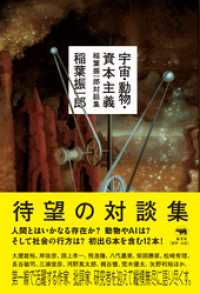- ホーム
- > 洋書
- > ドイツ書
- > Social Sciences, Jurisprudence & Economy
- > Jurisprudence & Law
- > general surveys & lexicons
Full Description
From there, the theorists have argued that in a myriad of ways, the law violates the probability calculus unforgivably.Today, other theorists are newly realizing that in large part the law does not deal in probability. Instead of combining findings by the rules of probability, the book uses the rules of multivalent logic.
-

- 電子書籍
- ワタシってサバサバしてるから(42) …
-

- 電子書籍
- 宇宙・動物・資本主義






